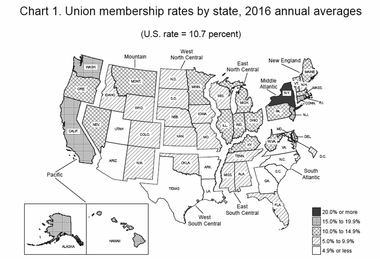Labor Day lessons - solidarity is the solution

by Dustin Woods
Visionary Columnist
September is upon us again and with it comes one of the less celebrated government holidays - Labor Day. To many, it’s the last three-day weekend of summer and the official last day to wear white. To others, it stands for much more.
Labor Day doesn't elicit the reverence of the other holidays. However, Labor Day recognizes the incredible contributions to society of working class Americans and honors the successes of the labor movement.
Thanks to the labor movement of yore we have some of the great staples of our modern work life: a limit on the number of hours in a regular work week, overtime pay for hours beyond the regular work week, a minimum wage, the right to unionize formalized in federal law and protections against workplace hazards, just to name a few.
These rights that we take for granted today were bought with the price of great hardship and even death for the workers who stood up to the great moneyed interests of the times. In 1894 the Pullman Strike crippled industry across much of the United States. The U.S. Army was used to end the deadly strike and resume railroad operations in the country. About a week after the strike, President Grover Cleveland signed into law the act that began the national Labor Day.
Today, however, the labor movement has moved into a position that leaves it a broken shell of what it once was. According to the Bureau of Labor Statistics, in 1963, 29.3 percent of American workers were in a union. Today only 10.7 percent are members of a union.
The labor movement in America would do well to learn some lessons from the LGBT+ movement. We obtained the strength of solidarity by bringing together many disparate communities to stand up for each other, as all their goals were ultimately the same. When the individual movements were brought together under the alphabet umbrella, they found strength in numbers and were able to coordinate efforts more effectively and efficiently.
The labor movement’s goal is to benefit workers. The way they achieve that is by organizing specific workers by trade or organization. Rather than continue a clearly declining model, perhaps the labor movement should organize labor of all types under a single unified banner the same way the LGBT+ community did.
Among those industries with the lowest levels of union representation are food and drinking service, professional and technical services and retail. I point these out to show that many of the professions I see my LGBT+ family pursuing are those with the lowest levels of union representation.
Though I can't argue direct causation, one can't deny there is a strong correlation between a lack of union protections in these industries and the fact that 15 to 43 percent of gay and lesbian workers have experienced some form of workplace discrimination.
Ninety percent of transgender individuals report experiencing some form of discrimination in the workplace, according to data from the Center for American Progress. They also report that gay men make 10 to 32 percent less than their hetero counterparts with similar qualifications.
I can't help but think that if more of the LGBT+ community were represented by a union in their profession that they wouldn't encounter so many disparaging situations and discriminatory differences.
The infringement or the rights of one worker should be a concern to all workers in every industry. Collective solidarity isn't just an ideal for the labor movement. It is embodied in one of my favorite quotes from civil rights leader Dr. Martin Luther King Jr. who said, “Injustice anywhere is a threat to justice everywhere.”
What justice is there in someone making a profit from the full-time labor of their employees when those employees are unable to afford the basic needs of life from that work? There must be a higher standard for how we treat all humans with basic human dignity and a slavish devotion to profit is not the way to achieve that end.
Copyright The Gayly - 9/4/2017 7:21 a.m. CST





